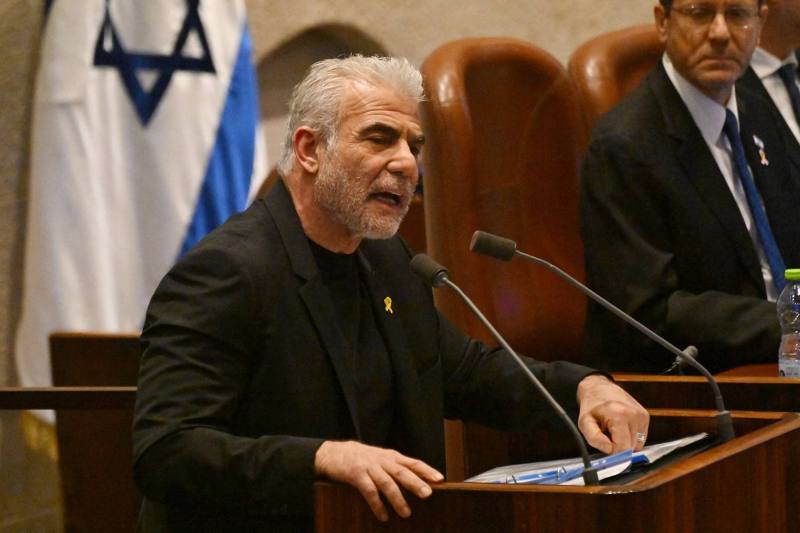Israel’s Lapid Lays Out Alternative to Trump’s Gaza Plan

Israel’s Lapid Lays Out Alternative to Trump’s Gaza Plan
The opposition leader’s proposal would see Egypt take temporary control of the enclave and oversee its reconstruction.
Israeli opposition leader Yair Lapid speaks at a parliament session in Jerusalem on Oct. 28, 2024. Debbie Hill/AFP via Getty Images
Israeli opposition leader Yair Lapid unveiled a plan on Tuesday for postwar governance in Gaza that would see Hamas removed from power and Egypt assume temporary control of the enclave once the current cease-fire deal is completed and all hostages are released.
“The world needs a new solution for the Gaza Strip,” Lapid said at an event held by the Foundation for Defense of Democracies (FDD) think tank in Washington. “The solution is Egypt will take responsibility for the management of the Gaza Strip for eight years with an option to extend to 15 years.”
Israeli opposition leader Yair Lapid unveiled a plan on Tuesday for postwar governance in Gaza that would see Hamas removed from power and Egypt assume temporary control of the enclave once the current cease-fire deal is completed and all hostages are released.
“The world needs a new solution for the Gaza Strip,” Lapid said at an event held by the Foundation for Defense of Democracies (FDD) think tank in Washington. “The solution is Egypt will take responsibility for the management of the Gaza Strip for eight years with an option to extend to 15 years.”
Under Lapid’s plan, dubbed the “Egyptian solution,” Egypt would take control of internal civilian and security affairs in the enclave while leading a peace force in partnership with Gulf states and the international community “for the management and rebuilding of Gaza.” This period of Egyptian guardianship would lay the groundwork for Gaza’s self-governance, according to Lapid, and the Palestinian territory would be demilitarized. His plan leaves the door open for the Palestinian Authority to be involved in Gaza’s governance in the future after “a process of reform and de-radicalization.”
As an incentive, the international community and regional allies would pay off Cairo’s $155 billion of foreign external debt. Lapid characterized his proposal as a means of simultaneously tackling Egypt’s economic challenges and Israel’s security concerns.
The proposal faces serious challenges right off the bat, most notably that Lapid has not yet consulted Egypt about the plan. “I am estimating they are going to say ‘no,’ and then ‘yes,’” Lapid said, adding, “I have worked with the Egyptians quite a bit and this is their way of doing business.” The Egyptian embassy in Washington did not immediately respond to a request for comment from Foreign Policy.
It’s also unclear whether the current Israeli government, which is not friendly to the notion of Palestinian self-governance, would be amenable to the basic tenets of Lapid’s Egyptian proposal.
But FDD CEO Mark Dubowitz hailed Lapid’s plan as putting “real meat on the bones to address core concerns about Gaza as expressed by President [Donald] Trump and the international community.”
Lapid presented the plan just weeks after Trump put forward a controversial proposal for the United States to “take over” and rebuild Gaza, displacing the enclave’s entire Palestinian population in the process.
“It is worth noting the proposal doesn’t contradict the idea presented by President Trump that the U.S. and the international community will rebuild Gaza,” Lapid said, describing the plan as an opportunity for Washington to cooperate with Egypt in terms of investments in the enclave.
But unlike Trump’s proposal, Lapid’s plan does not call for emptying Gaza out and seeing the local population moved into neighboring Arab countries—though Lapid said that Gazans would be permitted to leave under his plan.
As for whether Trump is open to this proposal, National Security Council spokesperson Brian Hughes told Foreign Policy that “President Trump stands by his current plan to rebuild Gaza and looks forward to discussing plans with our Israeli and Arab partners in the region.”
Arab countries, which have firmly rejected Trump’s plan, are expected to present their own proposal at an emergency Arab League summit in Cairo on March 4.
Though Egypt and other Arab countries are unlikely to respond to Lapid’s blueprint for Gaza with the same outrage as they did to Trump’s, experts are deeply skeptical that Cairo will be enthused by the prospect of being tied up in the Palestinian territories for years.
Lapid’s plan is likely to make Egypt “nervous,” Steven A. Cook, a senior fellow for Middle East and Africa studies at the Council on Foreign Relations, told Foreign Policy, because from Egypt’s perspective, Israel has long wanted to “dump Gaza on them.”
“The Egyptians don’t necessarily believe that they should be responsible for Gaza,” Cook said, adding that they think “it’s the Israelis who should have a lot to answer for there and that this is Palestinian land.”
The security implications of Lapid’s plan could also make it extremely unpalatable to Egypt.
“The plan is not realistic. Egypt has made clear that it does not intend to act as Gaza’s policeman on behalf of Israel. This would be costly and difficult for Egypt and a political disaster for the [Abdel Fattah al-]Sisi regime at home,” Daniel Byman, the director of the Warfare, Irregular Threats, and Terrorism Program at the Center for Strategic and International Studies, told FP.
One of the most glaring obstacles is the fact that Hamas, though significantly weakened, remains in power in Gaza and is unlikely to cede authority voluntarily. This means that under Lapid’s plan, troops from Egypt and other Arab countries could potentially become entangled in clashes with Hamas and other militant groups operating in Gaza.
“I can’t imagine that the ever-so-cautious Egyptian armed forces are going to want to deploy a lot of the guys into Gaza to maintain security, only to be shot at,” Cook said.
John Haltiwanger is a reporter at Foreign Policy. X: @jchaltiwanger
More from Foreign Policy
-

People stand in front of NATO headquarters in Brussels. It’s Time for Europe to Do the Unthinkable
Brussels has slavishly followed Washington for too long—and forgotten how to advance its own geopolitical interests.
-

Samuel Huntington holds his hand to his chin while sitting in an office. Samuel Huntington Is Getting His Revenge
The idea of a global “clash of civilizations” wasn’t wrong—it was just premature.
-

German Chancellor Olaf Scholz visits weapons maker Rheinmetall in Unterluess, Germany on Feb. 12, 2024. How Europe Can Defend Itself
Here are 10 steps European leaders can take now to bolster the continent’s defenses without U.S. help.
-

J.D. Vance gestures with both hands open as he speaks into a microphone during the Munich Security Conference. Vance wears a black suit with a blue tie. The New Meaning of ‘Munich’
After J.D. Vance’s bizarre speech, a word synonymous with appeasement may now signal the voluntary surrender of global hegemony.









Join the Conversation
Commenting on this and other recent articles is just one benefit of a Foreign Policy subscription.
Already a subscriber?
.
Subscribe
Subscribe
View Comments
Join the Conversation
Join the conversation on this and other recent Foreign Policy articles when you subscribe now.
Subscribe
Subscribe
Not your account?
View Comments
Join the Conversation
Please follow our comment guidelines, stay on topic, and be civil, courteous, and respectful of others’ beliefs.
Change your username |
Log out
Change your username:
CANCEL
Confirm your username to get started.
The default username below has been generated using the first name and last initial on your FP subscriber account. Usernames may be updated at any time and must not contain inappropriate or offensive language.